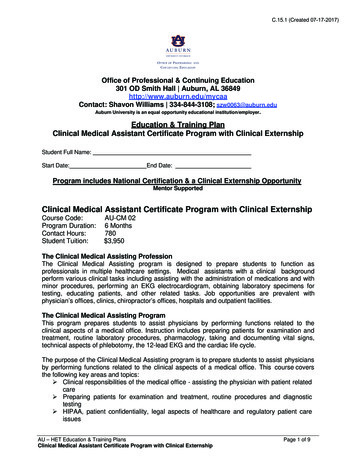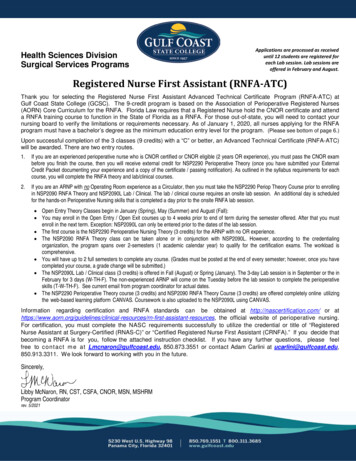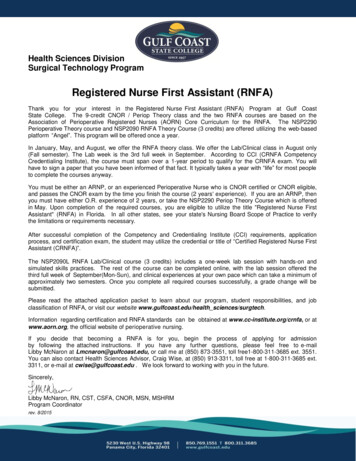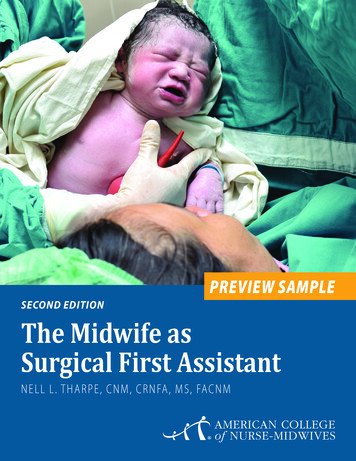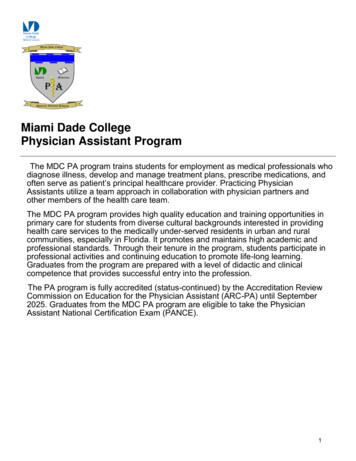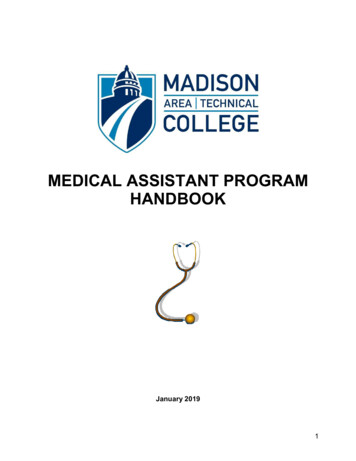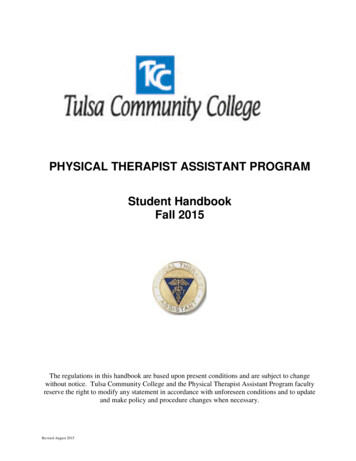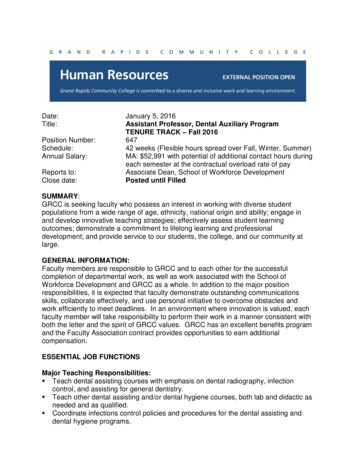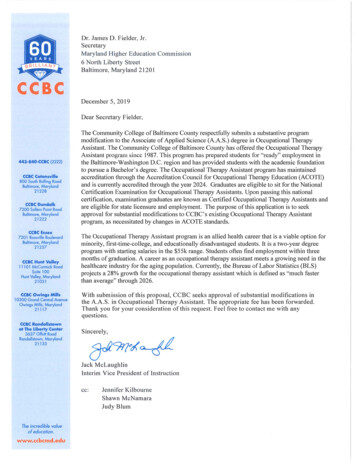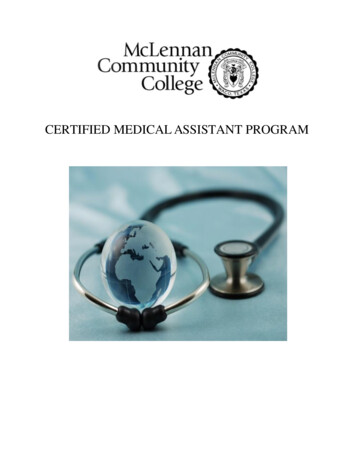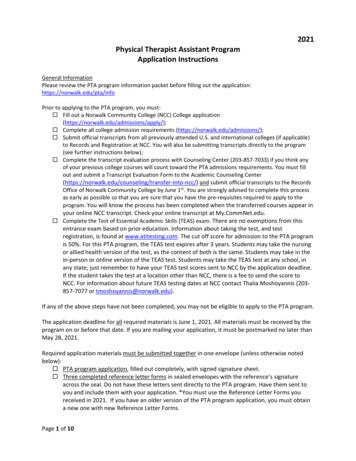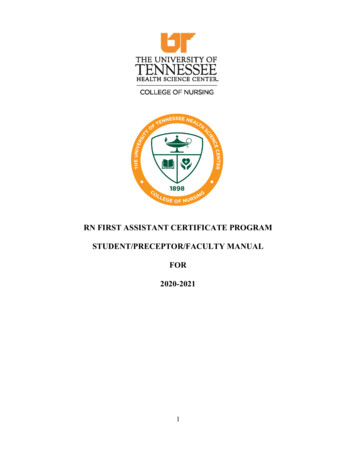
Transcription
RN FIRST ASSISTANT CERTIFICATE PROGRAMSTUDENT/PRECEPTOR/FACULTY MANUALFOR2020-20211
Table of ContentsOption Goals .3Purpose of this Manual .4Faculty & Staff List . 5Expectations of RNFA Students .6Student Responsibilities for Clinical ExperiencesScheduling of Clinical ExperiencesProfessional Dress and BehaviorPreparation for Clinical ExperiencesAttendance in Assigned Clinical ExperiencesUse of Medatrax to Track ExperiencesExpectations of Preceptors & Volunteer Faculty . .8Important Aspects of the Student and Preceptor RelationshipPreceptors Can Expect Students To:Preceptors Can Expect Faculty To:Preceptors Who Wish a Volunteer Faculty AppointmentExpectations of Faculty . 9Prior to the beginning of a clinical assignment:Throughout Course:Legal Agreement Requirements 10Site ApprovalPreceptor/Volunteer FacultyCPR CertificationCriminal Background CheckDrug ScreenImmunizationsCollege of Nursing Forms used in the RNFA program .122
Goals of the RNFA Certificate ProgramWelcome to the Registered Nurse First Assistant Certificate Program. This is the first RNFAprogram offered in the State of Tennessee. The College of Nursing admitted its first RNFAstudents in August of 2017. The program meets the criteria established by the Association ofperiOperating Room Nurses (AORN) for RNFA programs and is listed as an approved programby the Competency and Credentialing Institute; the certifying body for Registered Nurse FirstAssistants.The RNFA Scope of PracticePerioperative nursing is a specialized area of practice. Registered nurses practicing as firstassistants in surgery are functioning in an expanded perioperative nursing role. The RNFA maybe either a registered Nurse who is a Certified Nurse in the Operating Room (CNOR) or anAdvanced Practice Registered Nurse, both of which are completing an approved RNFA program.First assisting behaviors are further refinements of perioperative nursing practice and thesebehaviors include certain delegated medical functions that can be assumed by the RN who isqualified to practice as an RNFA. Registered nurse first assistant behaviors may vary dependingon patient populations, practice environments, service provided, accessibility of human and fiscalresources, institutional policy, and state nursing regulations.Registered nurse first assistant behaviors in the perioperative arena include, but are not limitedto: preoperative patient management in collaboration with other health care providers, such as:performing focused preoperative nursing assessments and communicating and collaboratingwith other health care providers regarding the patient plan of care; and intraoperative performance of surgical first assistant techniques such as: using instrumentsand medical devices, providing surgical site exposure, handling and/or cutting tissue,providing hemostasis, suturing, and Wound management postoperative patient management in collaboration with other health care providers in theimmediate postoperative period and beyond, such as: participating in postoperative roundsand assisting with patient discharge planning and identifying appropriate communityresources as neededThe APRN practicing in the perioperative environment as a first assistant at surgery Functions in an expanded perioperative APRN role; Functions autonomously as part of the surgical health care team to achieve optimal patientoutcomes in the preoperative and postoperative management of surgical patients and theircomplex responses to the surgical process; Functions in the perioperative arena with responsibilities based on role specific competency,patient populations, practice environments, accessibility of human and fiscal resources, andhealth care organization policy; accessibility of human and fiscal resources, and health careorganization policy; functions intraoperatively as a first assistant at surgery only and not concurrently as a scrubperson or circulator; and3
functions intraoperatively in a coordinated manner with the surgeon while using instrumentsand medical devices, providing surgical site exposure, handling and/or cutting tissue,providing hemostasis, suturing, and wound managementGraduates are eligible to take national certification examinations for Certified Registered NurseFirst Assistant or CRNFA. Graduates are expected to contribute to the delivery of quality healthcare through their implementation of evidence-based practice.Purpose of the ManualThe purpose of this Manual is to acquaint students, preceptors and faculty to some of theelements that are a part of the clinical education of RNFA students. The processes of selecting,approving, administering, and evaluating the wide variety of clinical learning experiences are.Hopefully, this document will provide guidance.Education is a dynamic undertaking and there are a number of changes that take place over theschool year. Please work with the faculty for any questions you have not answered by thismanual.4
RNFA Administration and FacultyNatasha Goins, DNP, APRN, FNP-C, AG-ACNP-BC, RNFADirector, RNFA Certificate ProgramOffice phone number . (901) 448-2132Email address . ngoins1@uthsc.eduNancy Appling MSN, APRN, ACNP-BC, CNOR, CRNFAInstructor RNFA Certificate ProgramEmail address nappling@uthsc.eduJohn Nelson, MDMedical Director RNFA Certificate ProgramOffice Phone Number (901) 355-0414Email Address . jnelso17@uthsc.eduCON AdministrationSusan Jacob PhD, RN, Professor and Executive Associate Dean of Academic AffairsOffice phone number .(901) 448-1320E-mail address.sjacob4@uthsc.eduBobby Bellflower, DNSc, NNP-BC, FAANP Associate Professor & Director DNP ProgramOffice phone number .(901) 448-4153Cell phone .(901) 921-7621E-mail address . .bbellflo@uthsc.eduCON StaffRachel George, BSN, FCN, IBCLCClinical Coordinator DNP ProgramOffice phone number . (901) 448-2810E-mail address . rgeorg13@uthsc.eduTrimika Bowdre, PhD, MPHDNP Program CoordinatorOffice phone number . . (901) 448-6099E-mail address . tbowdre@uthsc.edu5
6
Expectations for RNFA StudentsThe general expectations for students in the College of Nursing are contained in the UTHSCCatalog and CenterScope located at http://catalog.uthsc.edu/ . This document focuses on specificissues for the clinical aspects of the RNFA Certificate Program.RNFA students work with a number of faculty, staff and preceptors as a part of their clinicaleducation. Several official documents must be executed prior to beginning any clinicassignment. You will need to know which documents must be completed, by whom and when.Your faculty, with the assistance of the Clinical Coordinator, will identify and assign yourclinical site and preceptor. All clinical sites and preceptors are required to be approved andproper documents executed between them and the university prior to you beginning to seepatients at the site.Student Responsibilities for Clinical Experiences Review course outcomeso Your faculty will discuss with the preceptor what is expected for the course. You areresponsible for knowing what you are to be learning and how your learning progresses inthe course. Meet with Preceptor, if indicated.o Some preceptors prefer to interview you prior to agreeing to work with you while othersdo not. If you have an interview, you should use it to your advantage. Provide the preceptor with an understanding of your level, ability, and personality. Enable the preceptor to assess if you will be a “good fit” for the clinical site and thepopulation it serves. You can put your best foot forward by being prepared with a CV.Scheduling of Clinical Experiences Clinical practicum experiences are scheduled at the convenience and availability of thepreceptor.o Please do not expect preceptors to conform to a schedule that meets your employmentneeds.o You and the preceptor need to agree on the days and times you will be in the clinicalagency prior to beginning.o Unless otherwise stated in the syllabus, you are expected to begin the clinical experiencewhen the course starts and complete when the course ends. Schedule the start and end dates along with the days of the week for the entire time you willbe in site and place this in Medatrax. Schedule the course evaluation with the preceptor.7
Professional Dress and Behavior You are a representative of UTHSC College of Nursing so please present yourselfprofessionally. Please be respectful of preceptors, faculty, staff, patients and their families. You should be professionally dressed and wear your UTHSC Student ID. A short lab coat with the UTHSC patch on left upper arm is appropriate unless the preceptorsays otherwise. You should follow the dress and OSHA standards for clinical attire of your clinical site. You should express your appreciation to your preceptors for their assistance.Preparation for Clinical Experiences Please be prepared including credentials, dress, location, and timing, before the first clinicalday at the clinical agency. Discuss questions about computer access, the procedure for preceptor cosigning documents,eating and parking arrangements, and communication with other disciplines. Please clarify the preferred method to notify the preceptor in the event of a late arrival orabsence. Learn something about the preceptor to acknowledge the preceptor's background and broadenyour educational experience.Attendance Attendance at the negotiated times and days with the preceptor is required. Documentation in Medatrax is another requirement. Faculty will monitor this to help youassure you are meeting the required minimum expectations. Be proactive with your faculty if you find you are running into problems in meeting yourminimum expectations. Rarely can you expect to receive an incomplete for a clinical course. Immediately notify the preceptor and faculty if you are not able to attend a scheduled day. You will need to present a plan to make up the missed experiences and have this approved bythe faculty and preceptor. Unapproved absences for assigned clinical experiences are a violation of professionalbehavior and may result in disciplinary action.Use of Medatrax to Track ExperiencesThe Medatrax system is used to provide on-line tools specifically designed to assist in recordingand maintaining student and clinical data. Each student as a specific account. Students track clinical time and log patient encounters.Students upload and maintain current RN licensure and CPR certification.Students may also upload required clinical forms or complete other clinical assignments.Faculty review Medatrax to assure students are on track.Approved preceptors and clinical sites are maintained in Medatrax.8
Expectations of Preceptor and Volunteer Faculty Mentor and serve as a role model for student.Guide the student to meet the course outcomes.Identify appropriate clinical encounters for student.Direct the use of accepted clinical guidelines and standards of care.Tailor guidelines/standards to unique clinical situations.Assist student in refinement of interpersonal skills with patients and colleagues.Alert student and faculty of problem areas early for improvement.Evaluate achievement of the learning outcomes.Provide the student with feedback.Demonstrate high ethical standards.Demonstrate respect for the student’s faculty, curriculum, and program.Demonstrate the ability to manage multiple variables while carrying out patient andcolleague interactions.Important Aspects of the Student and Preceptor Relationship Immediately report to the faculty any student behaviors threatening the safety of the patientor risk to the clinical site. Monitor and report student performance including at risk of not meeting standards. Supervise student in the clinical setting. Communicate with the appropriate staff about the scheduling of patients, and specificprocedures to enhance learning with a minimal disruption of the office routine. Provide student evaluations using the appropriate Clinical Performance Evaluation forms. Understand the legal liability of the preceptor role.Preceptors Can Expect Students To: Meet with preceptor to clarify course objectives and focus of clinical activities. Assist preceptor completing required documents associated with preceptor role. Create an acceptable schedule with the preceptor. Contact the preceptor in case of any absence, prior to the absence. Negotiate with the preceptor for making up time missed if possible. Dress appropriately for the site and behave in a professional manner at all times.Preceptors Can Expect Faculty To: Provide course description, clinical outcomes, and the amount of time required. Provide information about the RNFA program. Provide methods to contact faculty member. Act on any problems affecting student progression in clinical coursework Guide preceptor in the student evaluation process. Provide feedback to preceptors on their performance.9
Preceptors Who Wish to Be Appointment Volunteer FacultyThe University of Tennessee recognizes the valuable contributions of people who give freely oftheir time and talents for the benefit of the University without compensation. The Tennesseelegislature in the enactment of the Tennessee Claims Commission Act of 1984 recognized theneed to protect volunteers from legal actions while performing their service on behalf of theUniversity. Volunteers who are registered with the University enjoy civil immunity from liabilityunder the Act. Volunteers are not covered for Worker's Compensation. We encourage preceptorsto consider becoming Volunteer Faculty in the College of Nursing.The following information is required to be recommended and approved as Volunteer Faculty: Curriculum vitae or resume Copy of current license 2 letters of recommendation from individuals who can speak about your professionalqualifications Permit a background checkPreceptors who wish to be recommended as volunteer faculty should notify a faculty memberwho will facilitate this process. Volunteer faculty also are eligible for: Discounted Membership to the UTHSC Fitness CenterAccess to the UTHSC Library, including online journals (e.g., Up-to-Date)Free evening and weekend UTHSC campus parking; andDiscounted fees at the UTHSC Dental Clinic10
Expectations of FacultyPrior to the beginning of a clinical assignment: Verify appropriateness of clinical site and contractual agreements. Orient new preceptors to the preceptor role and College of Nursing educational expectations. Review preceptor responsibilities with continuing preceptors related to course and level ofstudent. Prepare student for clinical experience including faculty specific communicationrequirements. Validate student qualifications for clinical practice. Understand the legal liability of the preceptor role.Throughout Course: Have a first-hand knowledge of the clinical site through either an in-person or a virtual sitevisit. Work with the student and preceptor to assure the learning outcomes are being met. Monitor use of clinical guidelines and standards of care. Support student in refinement of effective communication. Alert student to focus on problem areas early to provide an opportunity to refine skills bywhen practicum is completed. Communicate with preceptor regularly to monitor student’s progress in course. Evaluate students through direct observation and preceptor feedback using proper forms.Legal Agreement RequirementsThere are a number of documents that are required to be executed by the University ofTennessee prior to the beginning of any student clinical experience. Some of these are rathercomplex and can take from weeks to months to complete.Site ApprovalEach clinical site must have a current and valid contract between the clinical organization andthe University of Tennessee. This agreement specifies the responsibilities of eachorganization and provides legal protections for both. All currently approved sites are listed inMedatrax, but some may be difficult to find as the name of the organization may havechanged since the initial approval. The Clinical Coordinator can assist in identifyingapproved sites.Preceptor/Volunteer FacultyAll preceptors are required to be appointed by the College of Nursing as a preceptor orvolunteer faculty prior to accepting any students. This appointment provides recognition ofthe responsibilities of the preceptor and provides legal protections as well. All approvedpreceptors are listed in Medatrax.11
CPR, BLS and ACLS CertificationStudents are responsible for maintaining current certification in CPR, BLS and ACLS. Thecertification may expire during the time the student is in the program, but students mustrecertify to remain current. The dates of coverage for certification are listed in Medatraxunder each student’s site.Criminal Background CheckAll students undergo a required criminal background check prior to beginning the programand annually. Any changes are required to be reported immediately by students as a conditionof remaining in the program.Drug ScreeningDNP students undergo a required urine drug screen prior to beginning the program andannually. In addition, drug screens may be required for cause, random screenings, or clinicalagency requirements.ImmunizationsThe university requires that students complete a list of immunization as well as TB skin testsprior to engaging in any patient care. These data are maintained by the University HealthService. Some clinical agencies may have additional requirements for immunization, butstudents will be informed, and these will be provided prior to the specific clinical experience.12
AppendixCollege of Nursing Forms for the RNFA ProgramThe college of Nursing uses a number of different forms as a part of the program. Copies ofthese forms using int the RNFA Certificate Program are shown. Many of these forms are to beuploaded into Medatrax so that they are associated with the student.1. Student-Preceptor-Faculty Agreement2. Confirmation of Student-Preceptor-Faculty Agreement3. Preceptor and Faculty Evaluation of RNFA student4. Student Evaluation of clinical Site and Preceptor5. Faculty Evaluation of Clinical Site and Preceptor13
Student-Preceptor-Faculty AgreementSemester/Year:CourseThe preceptor agreement permits nursing students of the College of Nursing, Universityof Tennessee Health Science Center (UTHSC) to participate in a student preceptorshipin your facility,. Conditions of this program are as follows:(Clinical Site Name)The Affiliation period will betostudent,. The, will be under thesupervision of, acting as preceptor.(Preceptor Name)Professor, of the College of Nursing, serves as the liaisonwith your facility for the above course(s).Preceptor Responsibilities:1. Function as a role model in the clinical setting.2. Facilitate learning activities for no more than two students per day.3. Orient the student(s) to the clinical agency.4. Collaborate with faculty to review the progress of the student toward meeting clinicallearning objectives.5. Provide feedback to the student regarding clinical performance.6. Contact the faculty if assistance is needed or if any problem with student performanceoccurs.7. Discuss with faculty/student arrangements for appropriate coverage for supervision of thestudent should the preceptor be absent.8. Give feedback to the nursing program regarding clinical experience for student andsuggestions for program development.Nursing Program/Faculty Responsibilities1. Ensure that preceptors meet qualificatio
This is the first RNFA program offered in the State of Tennessee. The College of Nursing admitted its first RNFA students in August of 2017. The program meets the criteria established by the Association of periOperating Room Nurses (AORN) for RNFA
